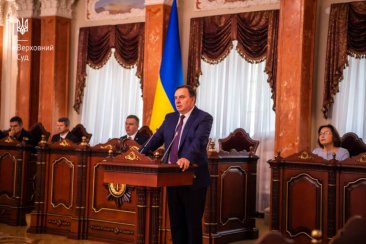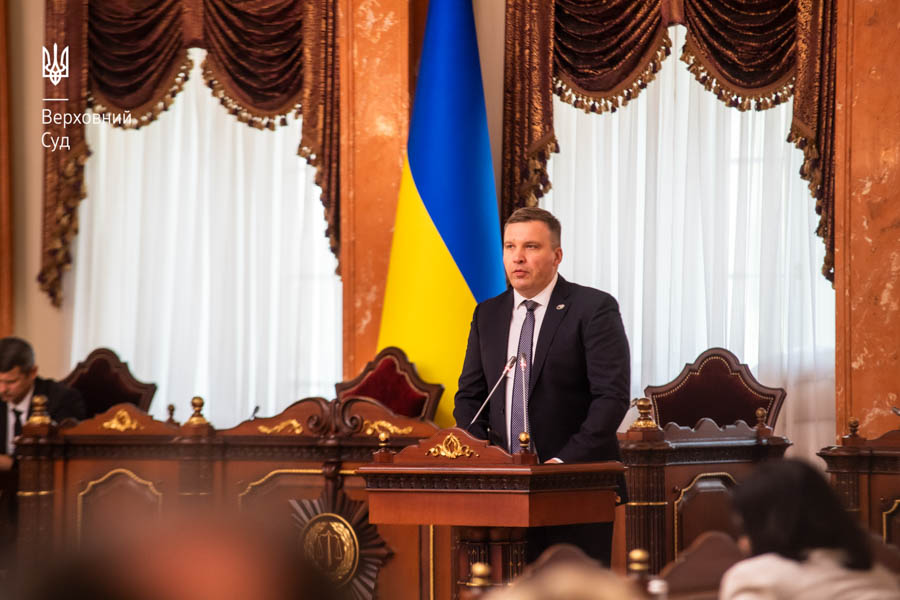Contact center of the Ukrainian Judiciary 044 207-35-46

The Supreme Court plays a key role in shaping a unified and sustainable judicial practice, and the coordinated work of the courts of all three instances and their effective interaction is crucial to ensure the application of the same approaches to resolving certain categories of disputes. Therefore, the establishment of mechanisms to ensure the unity of jurisprudence is an urgent issue for the entire judicial system.
This was stated by the President of the Supreme Court, Stanislav Kravchenko, during a special report at the judicial practical conference "Ensuring the Unity of Case Law in War-Related Matters", organised by the Supreme Court in co-operation with the OSCE Support Programme for Ukraine.
Stanislav Kravchenko noted that the Supreme Court systematically analyses its own jurisprudence in order to avoid cases where cassation courts apply different approaches to similar legal relationships. One of the effective mechanisms to overcome this problem is to refer the case to the joint chamber of the cassation court, which allows for a clearly structured and thorough opinion on a particular problematic issue.
Today, according to the President of the Supreme Court, there is a significant decrease in the number of cases referred to the joint chambers and the Grand Chamber of the Supreme Court, which indicates the formation of a well-established practice of resolving a significant number of legal issues arising in the course of litigation.
Stanislav Kravchenko also noted that last year the Supreme Court formulated more than 500 legal opinions in all jurisdictions, and it is very important that courts of all instances follow the practice of the Supreme Court and use the established legal positions when considering cases.
At the same time, the President of the Supreme Court emphasised the problem of ensuring the unity of jurisprudence in the decisions of investigating judges. This issue is particularly urgent in view of the need to ensure proper judicial control at the investigation stage of criminal proceedings for war crimes, of which more than 140,000 have been registered to date.
Another category of proceedings for which there is virtually no effective mechanism to ensure uniformity of jurisprudence is that of administrative offences dealt with by the courts. In this respect, there is a need to analyse and unify practice at the level of the appellate courts. In general, this issue should be regulated at the legislative level.

Vitalii Urkevych, Secretary of the Grand Chamber of the Supreme Court, noted that after the large-scale invasion of Ukraine by Russian troops, the Grand Chamber of the Supreme Court has received an increasing number of cases concerning the protection of the rights of victims of armed aggression, military personnel and military pensioners.
At the same time, the speaker noted that since the beginning of Russia's armed aggression against Ukraine in 2014, cases concerning compensation for damage caused by the destruction or loss of property as a result of hostilities have become part of the practice of national courts.
In his report, Vitalii Urkevych highlighted certain legal opinions of the Grand Chamber of the Supreme Court in the relevant categories of cases.
For example, in case No. 265/6582/16-ц on the claim for compensation by the State of Ukraine for property damage caused by a terrorist act due to damage to a commercial property in the Ukrainian-controlled territory in Mariupol, the Grand Chamber of the Supreme Court pointed out that the absence of a relevant law does not give rise to a legitimate expectation of receiving compensation from the State of Ukraine for non-residential property damaged during the anti-terrorist operation. The European Court of Human Rights agreed with these conclusions in the case of Roman Futorniak v. Ukraine (no. 41678/20).
The Grand Chamber of the Supreme Court also formulated conclusions on the jurisdiction of cases involving appeals by military personnel against decisions, acts or omissions of departmental housing commissions (decision of 8 June 2022 in case no. 362/643/21) and on the establishment of the fact of living in the same family as a deceased military personnel (decision of 18 January 2024 in case no. 560/17953/21).
In addition, by its decision of 9 June 2022 in case No. 520/2098/19, the Grand Chamber of the Supreme Court declared unlawful the restriction on payment of a pension acquired by a person in accordance with the procedure provided for by the Law of Ukraine "On Provision of Pensions for Persons Discharged from Military Service and Certain Other Persons".
The Secretary of the Grand Chamber of the Supreme Court also emphasised that the right of a person to judicial protection in the context of a threat to his or her life and health as a result of missile, artillery and drone attacks on Ukrainian settlements by the troops of the aggressor state is facilitated by the legal conclusion of the Grand Chamber of the Supreme Court in its Resolution of 13 September 2023 in case No. 204/2321/22, that the proper way for an individual to apply to the court is to apply via the official email address of the court with a procedural document signed by the QES.
Summing up, Vitalii Urkevych stressed that the importance of this and other legal opinions of the Grand Chamber of the Supreme Court in war-related cases cannot be overestimated, as they affect hundreds and thousands of cases pending before national courts. According to the Secretary of the Grand Chamber of the Supreme Court, adherence to such positions by courts of first instance and appellate courts will ensure predictability and stability of judicial practice, particularly in this category of cases.
.jpg)